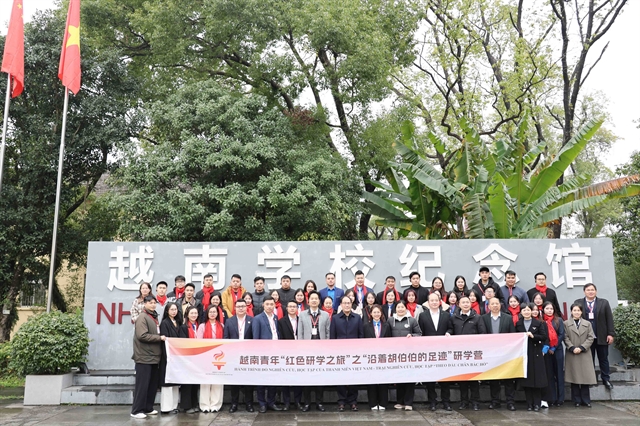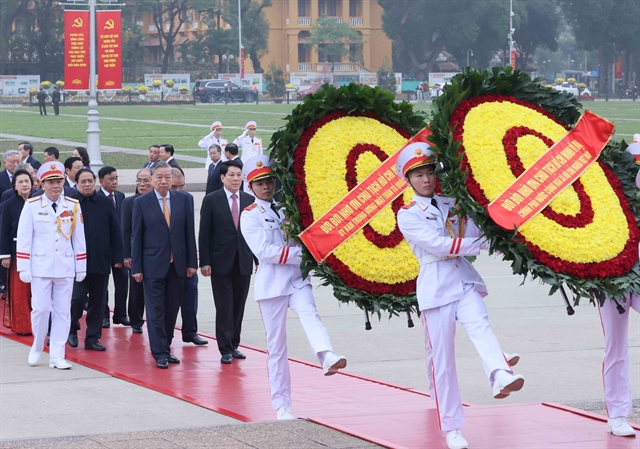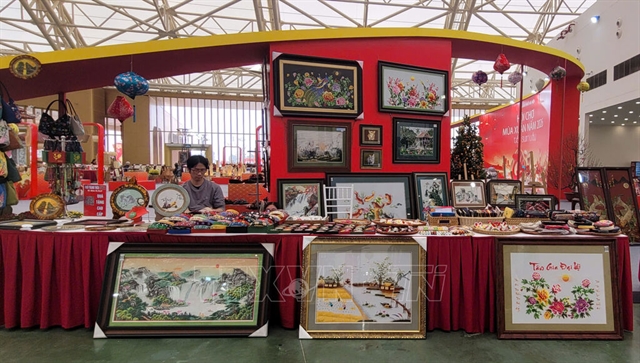.jfif) Opinion
Opinion

Đàm Mạnh Dương, Director of the Department of High Technology, under the Ministry of Science and Technology and Professor Doctor Trần Đình Thiên, Director of Việt Nam Institute for Economics, talk to Kinh tế Việt Nam & Thế Giới (Việt Nam and the World’s Economy) about Việt Nam and the fourth industrial revolution.
Đàm Mạnh Dương, Director of the Department of High Technology, under the Ministry of Science and Technology and Professor Doctor Trần Đình Thiên, Director of Việt Nam Institute for Economics, talk to Kinh tế Việt Nam & Thế Giới (Việt Nam and the World’s Economy) about Việt Nam and the fourth industrial revolution.
Đàm Mạnh Dương
Like other nations, Việt Nam is facing both challenges and opportunities via the fourth industrial revolution, or Industry 4.0. However, in my opinion, we face more challenges than opportunities.
Regarding the opportunities, Việt Nam is a late comer so with lessons learned from other nations we can take a short cut. We will be able to utilise opportunities presented to us while bypassing certain stages of development.
In addition, Việt Nam may adopt new models suitable to its own conditions in the course of economic development. However, Việt Nam will also face many challenges, particularly in technology, human resources, policies and infrastructure. It is a naked truth that our technology is at a moderate level and the level is not the same across the board. These are the hindrances for us in the course of implementing Industry 4.0, particularly the level of our human resources and infrastructure.
Though our country has actions to approach Industry 4.0, the readiness of each ministry and sector varies. For example, the Ministry of Trade and Industry, the State Bank of Việt Nam, the Ministry of Labour, Invalids and Social Affairs have been in the forefront of Industry 4.0. Meanwhile many other public agencies and sectors are still in the process of studying how to apply Industry 4.0 in their agencies.
To speed up the application of Industry 4.0, the Prime Minister issued Directive 16 urging all ministries and sectors to review, develop action plans and strategy to implement Industry 4.0.
The Ministry of Science and Technology (MoST) has been appointed as a focal point during the course of implementing the PM’s directive.
One of the activities that the MoST will start immediately is to promote the implementation of the Start-up Proposal. Also, the MoST will continue to implement Việt Nam’s Digitalized Proposal which was approved by the Government last May.
In addition, the MoST has co-ordinated with other ministries and agencies to implement some new models, including a project to turn Bắc Ninh City into a smart city and Hà Nam Province into a high-tech agriculture province.
To be on par with other countries in the course of implementing Industry 4.0, Việt Nam realised the importance of good infrastructure, particularly IT technology, including internet and 4G and 5G.
Việt Nam also needs a more transparent environment for business operation. This is a pivotal condition for creative enterprises.
Last but not least, we need to change our human resources training, starting from general education to tertiary education. This is the right plan for us to educate and train workers with high technological levels to meet the requirements of Industry 4.0.
Professor Doctor Trần Đình Thiên
The fourth industrial revolution is not simply a concept. It has spread widely like a fire and has strong impacts on humankind’s lives. Industry 4.0 will even have strong influences on our lifestyles, our communications and even the values of the humankind.
For example, the basic and traditional concept of family has gradually been changed in the course of rapid IT development with different generations in families adopting different approaches towards it.
In production, robots have gradually replaced workers. In the near future, simple jobs will be done by robots as their performance will be better and more precise than workers.
It is projected that Industry 4.0 will bring enormous benefits to mankind. But what about countries with economies based on mineral extraction and low labour cost like Việt Nam, no doubt, in the initial stage, it will have negative impacts. More specifically, energy technology or new materials and others will have strong negative impacts on the exploitation and use of natural resources as the world will not depend on so much on manual work like coal digging or crude oil extraction.
In my opinion, manual work in textile industry, assembling or traditional agriculture practices will be strongly impacted. It is forecast that in the next 20 years, simple jobs or manual jobs will be replaced by machines. As a consequence, tens of millions of traditional workers will lose their jobs.
In our case, I think that Industry 4.0 will have positive impacts on consumption. It is a good opportunity for Việt Nam to approach new information, knowledge, advanced services and others. In my opinion, Industry 4.0 should be considered an opportunity for our economy to be on par with other economies.
However, in order to absorb the novel ideas of Industry 4.0, Việt Nam must adopt good policies in human development, with science and technology the mainstay for the country’s advancement.
In addition, Việt Nam also needs to have healthy competition between enterprises and between different economic sectors. This is a foundation for transparency and accountability for our society.
Last but not least, the State should adopt a new approach to make our national economy adaptable to Industry 4.0.--VNS




